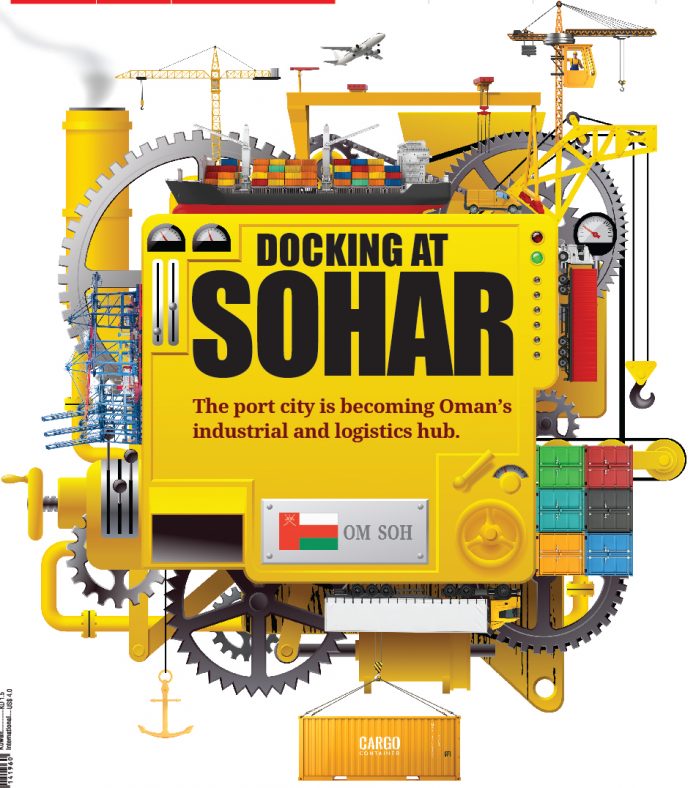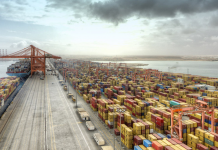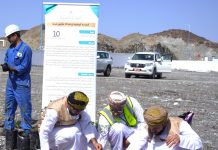Sohar is currently experiencing significant investment and economic shifts making it the focus of attention to many local and international investors and businessmen
With its strategic location, economic resources and high-population density, the Al Batinah North Governorate has occupied an important place in Oman’s history. Located at an enviable position outside the Strait of Hormuz, the port city of Sohar has always been Oman’s maritime and commercial outlet to the Gulf and the Indian Ocean while its mineral resources have provided the basis for several important heavy industries.
The mythical birthplace of Sindbad the Sailor is currently experiencing significant investment and economic shifts making it the focus of attention to many local and international investors and businessmen. With its state-of-the-art road network, deep-sea port, a thriving free zone, newly opened airport, planned railway system, wide market access and attractive business incentives, Sohar is now Oman’s fast growing industrial, logistics and manufacturing hub.
Sohar Port and Freezone is within easy reach of the booming economies of the Gulf and the Indian subcontinent while avoiding the additional cost of passing through the Strait of Hormuz. Companies in Sohar can target India, the Middle East, China and South East Asia while enjoying direct access to Abu Dhabi, Dubai, Al Ain and Muscat, as well as the biggest consumer market in the region, Saudi Arabia.
The Omani government has paid special attention to the city of Sohar, and placed it in the priorities of the future plan of the Omani economy, especially its ambitious strategy for the diversification of the national economy with focus on five vital sector: manufacturing, tourism, transport and logistics, mining, and fisheries.
Logistics hub
Sohar is emerging as one of the region’s prime logistical hubs, in line with the government of Oman’s Logistics Strategy 2040. Sohar Port and Freezone is a remarkable infrastructure development not just for Oman, but for the entire region. According to customs import/export statistics, around 62 per cent of Oman’s total import in 2017 entered the country via Sohar Port, and around 42 per cent of the exported volumes in 2017 were transported via Sohar. When considering value generation, Sohar Port and Freezone directly contributed $3.4bn to the economy, which is equivalent to 4.8 per cent of the total GDP of Oman.
Sohar Port and Freezone which celebrates 15 years of operations this year recorded impressive growth rates in 2018 and entered into new partnership agreements. Established in 2002, Port of Sohar has a strategic importance due to its nearness to the Strait of Hormuz. It is operated by Sohar Industrial Port Company (SIPC) and is considered a world class port. With current investments exceeding $25bn, it is one of the world’s largest port development projects. The port handled an average of 1.2 million tonnes of cargo every week in 2018 and has also set new records in both vessel calls and cargo throughput. Dry bulk and liquid bulk throughput increased by 14 per cent as compared to 2017 and the port received 3,443 vessel calls in 2018, marking a significant increase of more than 12 per cent.
Sohar Navigate, a unique online route planner recently launched by Sohar Port and Freezone, provides information on available connections to hinterland destinations. The platform is the first of its kind in the region and will comprise of sea schedules connecting to 550 ports worldwide.
The Navigate platform which was initially launched by Port of Rotterdam, is considered the most comprehensive route planner of its kind. Capitalising on this technology, Port Sohar has modified Sohar Navigate to suit its regional and global stakeholders and provide them with outreach, as well as a user-friendly means to locate the most efficient and optimal routes for their activities.
 Sohar Port and Freezone is currently home to logistic, petrochemical, metals, automotive and food clusters that feed downstream industries with iron, steel, plastics, rubber, ceramics, and chemicals, among other materials. In 2019, Sohar Port signed an agreement with RFX Industrial parks for the development of turnkey, bespoke built-to-lease logistics and light industrial units. These new logistics units will be developed over a 580,000sqm area within the Sohar Freezone and will comprise up to 290,000sqm of leasable space. It will offer various logistics size formats, including box and flex-log while also providing an easy solution of moving to larger units as tenant businesses expand. The work on Phase One of the project will begin in July 2019 and will be available for occupancy by the end of the year.
Sohar Port and Freezone is currently home to logistic, petrochemical, metals, automotive and food clusters that feed downstream industries with iron, steel, plastics, rubber, ceramics, and chemicals, among other materials. In 2019, Sohar Port signed an agreement with RFX Industrial parks for the development of turnkey, bespoke built-to-lease logistics and light industrial units. These new logistics units will be developed over a 580,000sqm area within the Sohar Freezone and will comprise up to 290,000sqm of leasable space. It will offer various logistics size formats, including box and flex-log while also providing an easy solution of moving to larger units as tenant businesses expand. The work on Phase One of the project will begin in July 2019 and will be available for occupancy by the end of the year.
Manufacturing
The goal of the Omani government is to make Sohar a business and industrial hub and help the Omani economy diversify away from oil. In order for the economy to achieve this economic diversification, the government is investing in a number of projects in the industrial area of Sohar.
It is investing more than $5bn in the steel industry in which Oman aims to be one of the Gulf Cooperation Council’s leading producers. In addition to the steel industry, there is also the industry of aluminium in Sohar industrial area. Sohar Aluminium Company was established in 2004 and is considered one of the leading projects that play a major role in the sultanate’s economic diversification strategy. A central component of Sohar Aluminium’s strategy is to promote and support the growth of downstream aluminium industries within the Sultanate.
A new factory that is being set up in Sohar to manufacture alloy wheels with an export value targeted at upwards of RO20mn is expected to generate up to 500 jobs for talented local workers across the 12 steps of its production process. Sohar Aluminium Plant, located next door to the alloy wheel manufacturing facility, will supply 45 per cent of the raw materials needed for the proposed output.
The Food Cluster at Sohar Port and Freezone has arguably been one of the most prominent projects, especially given the massive potential of the food industry, both in upstream and downstream businesses. This project will drive further integration between the port and free zone complex. The aim of this cluster is to promote the entire value chain of food processing and logistics support within the expanding multibillion-dollar regional food industry.
In a significant effort to tap into the Sultanate’s renewable energy potential, Sohar Port and Freezone recently entered into a land lease agreement with Shell Development Oman (SDO). This agreement means that businesses in the Sohar Freezone could be powered by solar photovoltaic (PV) projects instead of gas. In line with the partnership, Sohar Freezone will allocate 600-hectares of land for solar plants under development, with capacities ranging from 10MW up to 40MV. The pioneering project of 25MW will be focused on providing dedicated supply to Al Tamman Indsil Ferrochrome, and the entire development will create long lasting economic value for the nation and the companies within the free zone.
In December 2018, SV Pittie Sohar Textiles launched their textile cluster in Sohar with the inauguration of the company’s cotton yarn production unit No 1. Altogether, there will be four state-of-the-art yarn manufacturing units on this campus, covering over two million square feet area, housing the latest and most efficient automated technology in the textile industry, while also emphasising an optimal health and safety environment for its employees. With planned completion by November 2019, the units will compose of 300,000 spindles and 7,000 rotors producing over 100,000 metric tonnes of world-class compact cotton yarn. Total investment in the project is estimated at $300mn – an investment that has the potential to ignite the growth of a wider textile cluster over the long-term.
The GCC’s first glass recycling plant, a fully-automated facility with a production capacity of 650-tonnes per day, will be operational by the first half of 2020 atphase 7, Sohar Industrial Estate. Global Glass Recycling, which owns and will operate the plant, will be the first glass recycling facility within the Gulf Cooperation Council (GCC). It will be a fully automated plant with a 650-tonne per day capacity. The plant is particularly designed to meet the needs of varied glass manufacturers within the GCC region in terms of specifications, volumes and pricing.
Brazil’s mining giant Vale, the world’s No.1 iron ore and nickel producer, invested around $2bn in its pelletizing plant in Sohar with a nominal capacity of 9 million tonne of pellets per annum connected with a distribution cenre with 40 million tonnes of handling capacity. In November 2018, Vale signed a four-year contract with Emirates Steel, the largest steel producer in the United Arab Emirates, to supply iron ore pellets for the Arabian company’s steel production in Abu Dhabi.
Downstream industries
The existing oil refinery in Sohar is operated by Oman Oil Refineries and Petroleum Industries Company (Orpic) and produces 198,000 barrels per day. In addition to fuel products, the refinery also produces significant volumes of naphtha and propylene, which serve as feedstock for an adjoining aromatics and polypropylene plant.
Sohar Port and Freezone signed an agreement with Sanvira Industries Limited to set up a calcined petroleum coke (CPC) plant in the freezone area. The new petroleum plant will not only add value to the industries already present at the freezone, but will subsequently create several downstream opportunities. The calcined petroleum coke plant has a total investment of RO75mn and will take up an area of 18 hectares at the freezone. The plant will have an annual capacity of 440,000 million tonnes per annum (MTPA), executed in two phases: 280,000 MTPA in phase 1 and 160,000 MTPA in phase 2. The finished product, calcined petroleum coke (CPC), will be exported to aluminium and steel industries in and around the Gulf Cooperation Council (GCC) region.
 Liwa Plastics Industry Project
Liwa Plastics Industry Project
Orpic confirmed that the construction work in its Liwa Plastics Industry Project has exceeded the 67 per cent barrier in all four project packages. This project is one of the largest transformational projects in the Sultanate, which will contribute to improving and increasing the diversity of the production of Orpic, developing its business model and increasing profits, as well as developing the plastic products industry in the Sultanate and providing opportunities for business and employment in the Sultanate, besides providing new opportunities for business development in the Sultanate.
The project is expected to be completed by 2020. The total value of the project is $6.7bn, with $1.5bn being allocated as an added domestic value. The engineering, procurement and construction activities of this project extend over a period of four years until its launch in 2020, which will add greater value to the local value of the Oman through the efforts of the local value added management team at Orpic, which works together with key contractors for the four project packages.
Plastic production in the Sultanate is expected to rise after the operation of the Liwa Plastic Industries Complex at a rate of more than 2 million tonnes, which raises the production of Orpic of polypropylene and polyethylene to 1.4 million tonnes.
Through its operations in its integrated complex in Sohar, which includes refineries, aromatics plant, steam cracking unit, polypropylene and polyethylene plants, Orpic will become one of the most effective companies in the refineries and petrochemical industries in the world, which will enable the company to achieve the maximum value of the Sultanate’s production of hydrocarbons.
Getting a facelift
As the industries thrive and businesses expand, the wilayat of Sohar is being kitted out with real estate developments catering to the growing demand. Recently, Sohar Real Estate Development Company launched the Bazaar project in the Wilayat of Sohar, which comes as part of the real estate development projects worth RO13mn.
The Bazaar, which is expected to open in the second half of 2021, combines the traditional old market designs with the services currently offered in commercial complexes. Bazaar, which is under direct supervision by the Directorate General for Real Estate Development, would contribute to highlighting local products, which will be positively reflected on the growth of the retail sector and related sectors, as well as stimulating the commercial activity in Sohar.
The new project includes a traditional heritage market with more than 300 shops including commercial units distributed on multiple avenues. The shops are designed for selling handicrafts, date-palm-fronds made tapestries, copper utensils and silver pieces, spices, Arabian coffee, and fabrics and traditional costumes and modern fashion. They along with cafes, restaurants and family entertainment help to highlight traditional crafts in a modern environment, in addition to stimulating the commercial and tourism activity in the Wilayat of Sohar.
A major development in the retail sector was the opening of City Centre Sohar by Majid Al Futtaim in January 2019. The RO45mn mall houses some of the most sought-after international and regional retail stores, exciting entertainment and leisure experiences, and varied dining options from cafes to family restaurants. City Centre Sohar will service a population of 570,370 residents in the burgeoning port city and industrial hub of Sohar, and the surrounding districts of Liwa and Shinas. Conveniently located on Batinah Highway, City Centre Sohar has added 35,301sqm of gross leasable area to Oman’s booming retail sector. With 129 retail outlets, a 7,348sqm Carrefour Hypermarket and its 12th outlet in Oman, a nine-screen VOX Cinemas, Magic Planet and over 1,000 available parking spaces, City Centre Sohar is a fully integrated retail, dining, and leisure destination that is a new social hub for people to meet and connect.
Also read – Four Cargo Shops Sabotaged Near UAE






